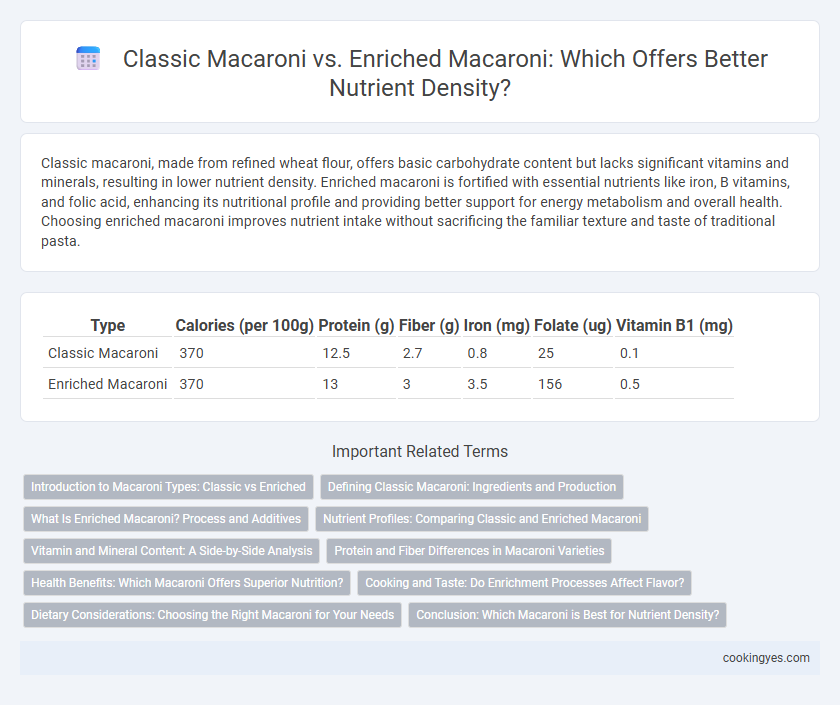Classic macaroni, made from refined wheat flour, offers basic carbohydrate content but lacks significant vitamins and minerals, resulting in lower nutrient density. Enriched macaroni is fortified with essential nutrients like iron, B vitamins, and folic acid, enhancing its nutritional profile and providing better support for energy metabolism and overall health. Choosing enriched macaroni improves nutrient intake without sacrificing the familiar texture and taste of traditional pasta.
Table of Comparison
| Type | Calories (per 100g) | Protein (g) | Fiber (g) | Iron (mg) | Folate (ug) | Vitamin B1 (mg) |
|---|---|---|---|---|---|---|
| Classic Macaroni | 370 | 12.5 | 2.7 | 0.8 | 25 | 0.1 |
| Enriched Macaroni | 370 | 13 | 3 | 3.5 | 156 | 0.5 |
Introduction to Macaroni Types: Classic vs Enriched
Classic macaroni is typically made from semolina flour and water, providing a basic source of carbohydrates with minimal micronutrients. Enriched macaroni, however, is fortified with essential vitamins and minerals such as iron, folic acid, and B vitamins, enhancing its nutrient density significantly. This enrichment process transforms macaroni into a more nutritious option, supporting dietary needs beyond basic energy provision.
Defining Classic Macaroni: Ingredients and Production
Classic macaroni is traditionally made from durum wheat semolina, which provides a firm texture and high protein content essential for pasta quality. The production process involves mixing semolina with water, followed by extrusion and drying, resulting in a product with minimal added nutrients. Unlike enriched macaroni, classic macaroni lacks fortified vitamins and minerals, making its nutrient density primarily reliant on the natural composition of durum wheat.
What Is Enriched Macaroni? Process and Additives
Enriched macaroni is pasta that has been fortified with nutrients, typically iron and B vitamins such as thiamine, riboflavin, niacin, and folic acid, to replace those lost during the milling process of refined flour. The enrichment process involves adding these synthetic or natural additives back into the pasta dough before drying, enhancing the nutrient density compared to classic macaroni made from refined flour without fortification. This process improves the nutritional profile of macaroni by increasing essential vitamins and minerals, contributing to better dietary intake and preventing nutrient deficiencies.
Nutrient Profiles: Comparing Classic and Enriched Macaroni
Classic macaroni typically contains basic nutrients such as carbohydrates and protein, but enriched macaroni is fortified with essential vitamins and minerals like iron, folic acid, and B vitamins, enhancing its nutrient density significantly. The enrichment process addresses common dietary deficiencies, offering improved nutrient profiles that support overall health, particularly in populations at risk of anemia and neural tube defects. Comparing both types, enriched macaroni provides superior nutritional benefits while maintaining the same culinary versatility as classic macaroni.
Vitamin and Mineral Content: A Side-by-Side Analysis
Classic macaroni typically contains lower levels of essential vitamins and minerals compared to enriched macaroni, which is fortified with nutrients like iron, thiamine, riboflavin, niacin, and folic acid. Enriched macaroni enhances overall nutrient density by closing the gap in micronutrient intake, especially for populations at risk of deficiencies. Consumption of enriched macaroni contributes to improved vitamin B-complex and mineral status, promoting better health outcomes over classic versions.
Protein and Fiber Differences in Macaroni Varieties
Classic macaroni typically contains lower protein and fiber content compared to enriched macaroni, which is fortified with additional nutrients during processing. Enriched macaroni often includes added vitamins, iron, and B-complex nutrients, enhancing its overall nutrient density, especially in terms of protein and fiber. Choosing enriched macaroni can provide more dietary protein and fiber per serving, supporting better digestion and muscle maintenance.
Health Benefits: Which Macaroni Offers Superior Nutrition?
Enriched macaroni provides superior nutrition compared to classic macaroni by being fortified with essential vitamins and minerals such as iron, folic acid, and B vitamins, which support energy metabolism and overall health. Classic macaroni primarily offers carbohydrate calories with limited nutrient density, making enriched varieties a better option for those seeking enhanced dietary benefits. The added nutrients in enriched macaroni contribute to improved immune function, reduced risk of anemia, and better prenatal health support.
Cooking and Taste: Do Enrichment Processes Affect Flavor?
Classic macaroni offers a neutral taste that pairs well with a variety of sauces, while enriched macaroni incorporates added vitamins and minerals without significantly altering its flavor profile. The enrichment process, typically involving the addition of iron, folic acid, and B vitamins, does not negatively impact the cooking texture or taste, maintaining the familiar al dente bite. Nutrient density is enhanced in enriched macaroni, providing added health benefits without compromising the traditional culinary experience.
Dietary Considerations: Choosing the Right Macaroni for Your Needs
Classic macaroni typically contains refined wheat flour, providing basic carbohydrates but limited fiber and micronutrients, while enriched macaroni is fortified with essential vitamins and minerals such as iron, folic acid, and B vitamins to enhance nutrient density. For individuals with specific dietary needs, enriched macaroni offers a better option to support nutritional requirements, especially in diets lacking sufficient micronutrients. Low-fiber diets may favor classic macaroni, whereas enriched varieties benefit those seeking additional nutritional support without altering taste or texture significantly.
Conclusion: Which Macaroni is Best for Nutrient Density?
Enriched macaroni provides higher nutrient density compared to classic macaroni due to added vitamins and minerals like iron, folic acid, and B vitamins. Classic macaroni, typically made from refined flour, lacks these fortifications and offers fewer essential nutrients. For those seeking greater nutritional benefits, enriched macaroni is the superior choice.
Classic macaroni vs Enriched macaroni for nutrient density Infographic

 cookingyes.com
cookingyes.com